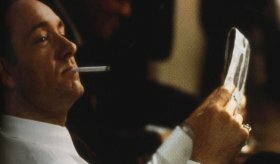|
|
| Tookey's Review |
|
| Pro Reviews |
|
| Mixed Reviews |
|
| Anti Reviews |
|
| Cast |
|
| |
 |
| |
| Released: |
1997 |
| |
|
| Genre: |
CRIME
THRILLER
|
| |
|
| Origin: |
US |
| |
|
| Length: |
138 |
|
| |
|
| |
|
|
| |
|
|
Three L.A. police detectives find themselves investigating different crimes - a wave of gangland assassinations, a prostitution racket, a seemingly senseless massacre in a cafe - which ultimately lead to the same criminal.
|
Reviewed by Chris Tookey
|
It’s a tough, detective thriller set in Los Angeles during the 1950s, so it was always bound to be compared with the Roman Polanski/ Jack Nicholson classic, Chinatown; but L. A. Confidential is even more stylish and gripping. And with three detective anti-heroes instead of just one, there’s a lot more suspense about which, if any, is going to survive to the end of the picture.
The most obviously heroic of the three cops is Ed Exley (Guy Pearce), a crusading moralist and by-the-book prig who’s cordially disliked by his fellow-officers. Pearce, the young Australian actor from Neighbours and Priscilla, Queen of the Desert, is wonderfully subtle and sympathetic as a humourless careerist who’s scarcely aware of how lonely he is.
Then there’s the defiantly unheroic Jack Vincennes (played by the excellent Kevin Spacey, pictured) a glib cynic who dresses smartly and enjoys the glamour of being technical advisor to a TV series, Badge of Honor, which presents an unrealistically rosy-tinted view of American law-enforcement. Jack is less interested in justice than in receiving backhanders from a sleazy magazine editor (Danny De Vito, dependable as ever) who derives a voyeuristic kick from exposing the sordid side of Hollywood life.
And there’s Bud White (played by New Zealander Russell Crowe) who is none too bright, unscrupulous when it comes to planting evidence on anyone he thinks is guilty, and given to brutal, pathological rages whenever he encounters violence against women.
The course of their investigation, immaculately adapted by Brian Helgeland and Curtis Hanson from the novel by James Ellroy (and greatly improved), does require effort to follow; but it is entirely logical, and I won’t spoil your enjoyment by revealing more. There are plenty of shocks and nasty surprises, with an extremely thrilling show-down, as the forces of darkness are confronted by - well, the forces of a slightly less murky grey.
The astonishing cinematography is the best work yet by Dante Spinotti, whose credits already include The Last of the Mohicans and Heat. Though shot in colour, L.A. Confidential looks and feels like classic film noir, with shadowy lighting, very dark deeds and the obligatory femme fatale in the voluptuous form of Kim Basinger.
Spiritually, though, this is less a film noir - concerned with revealing the dark side of humanity - than a film gris. It takes the darkness of the world as its starting point, and gradually becomes more generous-spirited, as it investigates how, despite their squalid moral environment, most people do try to retain a measure of self-respect and find some form of personal salvation. Unlike traditional film noir, L.A. Confidential does, in the words of its Johnny Mercer theme tune, "Accent-tchu-ate the Positive."
The film’s preoccupation with redeeming oneself through professionalism is similar to that which lay beneath Quentin Tarantino’s Pulp Fiction; but it’s a theme which has run through many of the great Hollywood movies about men, from Howard Hawks’s The Dawn Patrol to Michael Mann’s Heat.
Oddly enough in so male-dominated a movie, the actor most likely to win an Oscar is a woman. Kim Basinger is not only glamorous enough to convince as a high-class Hollwood call-girl, she manages to communicate an innate decency and perceptiveness about men that might enable such a person to endure the humiliations of her profession.
The rest of the cast (especially David Strathairn and James Cromwell) could hardly be better, and Curtis Hanson - long a polished director of impersonal films like The River Wild and The Hand That Rocks the Cradle - is so assured as to put one in mind of other great directors who chose to operate within the Hollywood system, like Howard Hawks and Michael Curtiz.
Just as modern Chinese directors often make period pictures which talk in coded terms about their own time, Hanson has made no cosy costume drama. His portrait of a racist, sadistic, profoundly corrupt Police Department has strikingly modern resonances, and not only in America. The movie exposes an exploitative, drugs-ridden, hypocritical side of the entertainment industry which still exists, and which West Coast film-makers are not usually keen to publicise.
There is plenty of brutality and revolting behaviour on display, and parts of this movie are as gruesome as anything in the best thriller of last year, Seven. If you can cope with that (and a half-happy ending that savours of studio intervention), L. A. Confidential is a film that can be recommended with confidence. It’s a detective movie on a par with such acknowledged classics as The Big Sleep. I think it’s one of the best films that Hollywood has ever produced.
|
|
|
